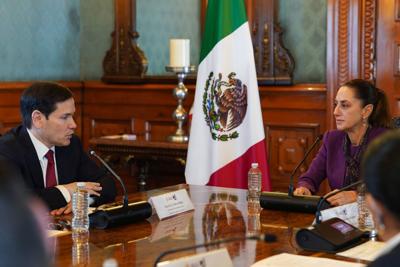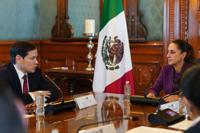
Mexican President Sheinbaum, right, met with US Secretary of State Rubio on September 3, 2025.
Following the meeting between U.S. Secretary of State Marco Rubio and Mexican President Claudia Sheinbaum Pardo, held on Wednesday, September 3, in Mexico City, it is expected that the president will significantly intensify the fight against corruption, said Ilan Katz.
The prominent Mexican lawyer stated that corruption is an issue that Marco Rubio has constantly raised against the Mexican government, which is why it will be one of the priority points of this visit.
This comes after Ismael “El Mayo” Zambada García was recently sentenced to life in prison by a New York court, where he admitted that throughout the time he operated in Mexico, he did so under the protection of politicians, police officers and military personnel.
The statement also comes at a time when the U.S. government has hinted at the existence of a list of Mexican officials under ongoing judicial investigations: “Everything indicates that the famous list does exist and that those who appear on it will face consequences,” said Katz.
As president of the Mexican Bar Association, Katz argued that Claudia Sheinbaum has a strong interest in fighting corruption, even if it implicates senior members of the National Regeneration Movement (Morena), the party that the President belongs to.
“I do not believe it is in President Sheinbaum’s interest to protect anyone who has legal issues in the United States, because rather than formalizing a diplomatic relationship, covering up would be the worst way to approach bilateral relations,” Katz said.
The existence of the alleged list is linked to concrete actions taken by the U.S. government against Mexican politicians, specifically the cancellation of visas for members of the Morena party.
Among those who have lost this privilege are Baja California governor Marina del Pilar and her husband, Carlos Torres; Norma Alicia Bustamante, mayor of Mexicali, and her husband, Samuel Guerrero Delgado; Juan Francisco Gim and Óscar Eduardo Castro Castro, mayors of Nogales and Puerto Peñasco, Sonora, respectively; Alberto Granados Fávila, mayor of Matamoros; and Melisa Cornejo, Morena state councilor in Jalisco.
According to the lawyer, there is no official information from the U.S. government explaining why these actions are being taken: “There’s a blackout; it is only said that visas are being revoked as a result of investigations. It is not even specified whether these actions are related to the statements made by ‘El Mayo’ Zambada. What is clear is that actions speak louder than reasons,” he said.
In addition to the fight against corruption, Katz sees national sovereignty as one of the issues to be addressed, given the long history of collaboration between Mexico and the United States to achieve common objectives such as combating organized crime, money laundering and migration issues.
However, the sovereignty issue has become a point of contention in Mexico, after President Donald Trump deployed thousands of troops to the southern border and instructed the Pentagon to study the possibility of carrying out military operations against cartels he has designated as terrorist organizations.
Katz insisted that cooperation is not a violation of national sovereignty but rather an obligation Mexicans have to address a problem together with the United States, namely drug trafficking, especially fentanyl.
He dismissed the possibility of U.S. military activity in Mexico, as this would generate a diplomatic crisis. And although understandings between the two countries may be announced openly and officially, he said it is unlikely that details and specific strategies will be disclosed.
“What we know is that Mexican cartels are the largest criminal organization in the world, that is not rhetoric,” he added, “and they have a presence in the United States. So the equation is simple: the less fentanyl crosses the border, the fewer deaths there will be.”
Regarding the criminal profile—how and through whom Mexican cartels operate in the United States—Katz said he was not in a position to provide an answer.
Although the President has only been in office for one year, the lawyer dared to describe Claudia Sheinbaum’s term as one of the best periods in the history of U.S.–Mexico relations, evidenced by the extradition of 29 Mexican kingpins.
Regarding the mass deportation policy implemented by the United States, he said migration would be an issue to be addressed between the Secretary of State and the Mexican president, and pointed out that the U.S. has the right to deport anyone who has broken the law and is in the country illegally.
However, he considered that migration will decrease in the long run if the United States facilitates migration in the short term, since Mexicans who travel to the U.S. for specific jobs will return sooner than if they pay a high cost to cross the border illegally.
Clear objectives for combating organized crime
For there to be a genuine fight against organized crime between Mexico and the United States, both countries must draft and publicly release a plan, one that is measurable and aims to pacify the region, said Damián Zepeda Vidales.
The political analyst and former leader of the National Action Party (PAN) welcomed the fact that there was an official meeting between Rubio and Sheinbaum, which means that despite the strong statements made by Trump against Mexico, dialogue still exists.
He said that his party (PAN) is one of the main promoters of this alliance, as evidenced by Senator Lilly Téllez’s request for cooperation with the U.S. government to fight Mexican cartels, an action that led to controversy and accusations of treason against the legislator.
For Zepeda Vidales, there is a pact of impunity between the current Morena government and organized crime groups, in addition to complicity between former President Andrés Manuel López Obrador and the cartels.
“That is the only way to explain the increase in crime and violence during the past six-year term,” he said, “when the security strategy was ‘hugs, not bullets’ for criminals. Fortunately, President Claudia Sheinbaum changed the plan, but apparently, part of the impunity pact continues.”
The states of Tabasco, where former governor Adán Augusto López is linked to the La Barredora cartel, and Sinaloa, with Governor Rubén Rocha Moya—who was accused by ‘El Mayo’ Zambada of having ties to drug trafficking—are the most evident cases of complicity between Morena and criminal groups, he said.
In this growing climate of tension came the visit of Rubio, who, after meeting with Sheinbaum, praised her government. After the meeting, neither of the two leaders made an official statement, said the former legislator.
The fear is that the U.S. government might strike under-the-table deals and grant safeguards to the Mexican government, and that cooperation meant to dismantle criminal groups may not take place, he added.
Therefore, Zepeda Vidales emphasized the need for a measurable collaboration plan, one that establishes penalties for drug producers and exporters, money launderers and politicians who cover up such actions.
The ideal, he said, is to have a project similar to the Free Trade Agreement, but focused on the security of both countries, since acting outside the framework of the law is not advisable.
An example that this practice is still in place was the extradition of 26 Mexican kingpins, which on the one hand, is a positive strategy, but on the other hand, legal mechanisms were not respected in the process, he said.
Other cases, he noted, include the possible delivery of biometric data of Mexican citizens to the U.S. government, as a result of a series of recently approved constitutional reforms.
Official statements
After the meeting, the president of Mexico announced on her X account: “During the cordial meeting with the Secretary of State of the United States, Marco Rubio, we agreed on the cooperation program on border security and law enforcement, after several months of work. It is based on four pillars: reciprocity; respect for sovereignty and territorial integrity; shared and differentiated responsibility; and mutual trust.”
For his part, Marco Rubio posted on the same social network: “Through our joint collaboration with President @Claudiashein, the U.S. and Mexico have strengthened border security, taken action to dismantle the cartels, made progress towards sharing water resources, and promoted new economic opportunities. Today we discussed these issues and the importance of resolving trade and non-trade barriers in line with @POTUS’ America First foreign policy.”











(0) comments
Welcome to the discussion.
Log In
Keep it Clean. Please avoid obscene, vulgar, lewd, racist or sexually-oriented language.
PLEASE TURN OFF YOUR CAPS LOCK.
Don't Threaten. Threats of harming another person will not be tolerated.
Be Truthful. Don't knowingly lie about anyone or anything.
Be Nice. No racism, sexism or any sort of -ism that is degrading to another person.
Be Proactive. Use the 'Report' link on each comment to let us know of abusive posts.
Share with Us. We'd love to hear eyewitness accounts, the history behind an article.